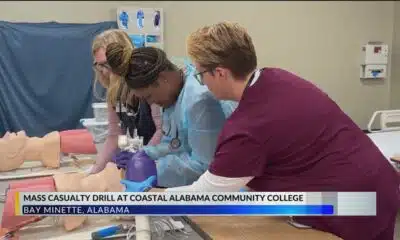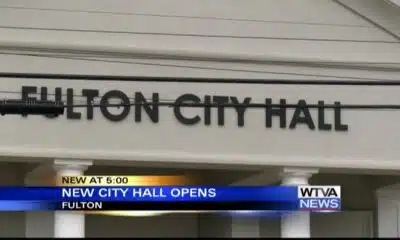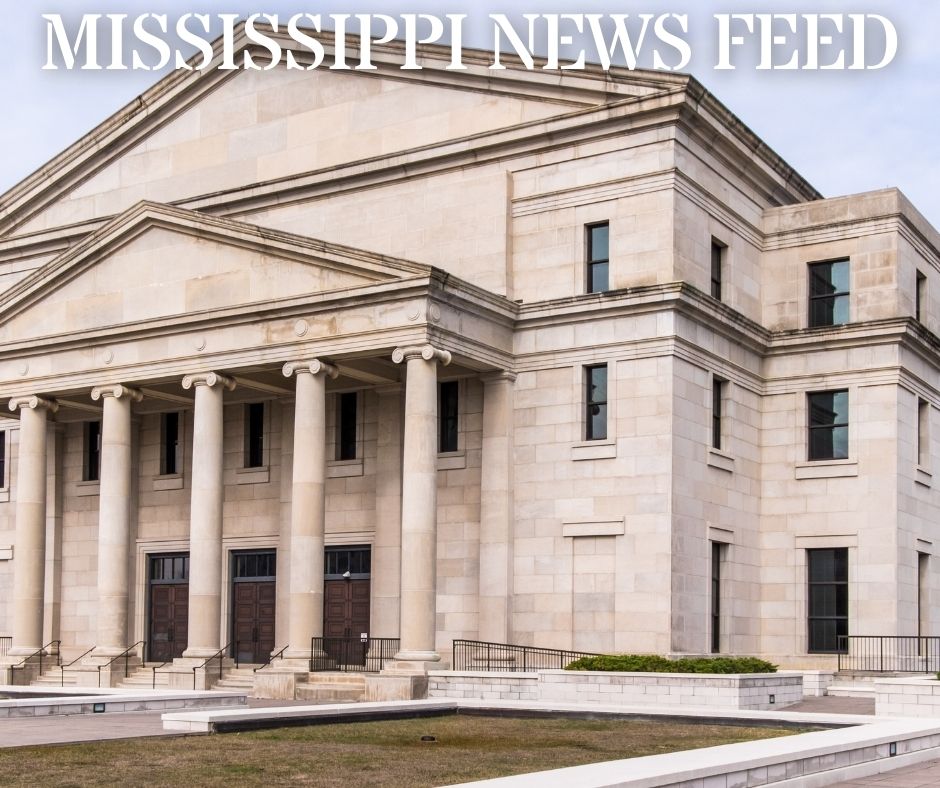Mississippi News
Medicaid in Mississippi: the real cost of not expanding it
‘It makes it hard to work’: The real cost of not expanding Medicaid in Mississippi
Briana Wright has worked all her adult life. The 27-year-old Kosciusko resident has been a crew member at McDonald’s for three years. Before that, she worked for Tyson Foods, where she mostly hung chickens for processing.
Wright is stuck in what is commonly referred to as the healthcare coverage gap. She is one of the 300,000 or so Mississippians with no health insurance because she can’t afford private health insurance but doesn’t qualify for Medicaid.
States have had the option to expand Medicaid eligibility to most people with incomes under a certain level — about $30,300 annually for a family of three — since 2014. Mississippi remains one of 12 states not to expand despite profound financial benefits and an increased federal matching rate under the American Rescue Plan Act of 2021.
As Wright and other Mississippians in similar positions continue to struggle, state lawmakers once again have decided not to consider expansion and do not seem poised to do so anytime soon.
The current program covers the disabled, poor pregnant women, children and some elderly people. Generally speaking, able-bodied adults are not eligible for Medicaid in Mississippi.
If state leaders were to expand Medicaid, at least 225,000 Mississippians would qualify for healthcare coverage — including Wright.
As a result of being uninsured, Wright doesn’t see any doctors annually for checkups or preventative care.

But in May of last year, she started vomiting and experiencing severe pain in her abdomen. The intensity of the pain led her to the local emergency room. The doctors suspected pancreatitis, but at a follow-up appointment the next month with a surgeon at Jackson-based Central Surgical Associates, she was told she needed her gallbladder removed.
She let her doctor know she had no health insurance, and he suggested reaching out to the Mississippi Department of Rehabilitative Services to see if she qualified for its vocational rehabilitation program. The program offers resources to people with disabilities that impede their ability to work.
The program agreed to cover the costs of her surgery so she could continue working. Last fiscal year, the department spent over $10 million on “physical restoration,” or medical services for Mississippians with disabilities, according to the department spokeswoman. “Disabilities” are defined as any condition that is an impediment to someone gaining or maintaining employment. Despite the absence of Medicaid expansion, the state is still footing the bill to cover some working Mississippians’ medical care.
Wright was approved for the program, and she thought she had found the solution to her problem — until the $245 bill for the Central Surgical Associates consultation appointment came in the mail. She had thought the appointment cost would be applied to her surgery bill, but she soon learned she was responsible. She couldn’t afford to pay it, and the vocational rehabilitation program doesn’t pay for past bills, she said.
According to Wright, she tried to set up a $25 a month payment plan with Central Surgical Associates, but they told her she had to pay in full in order to have the surgery.
Judy Skinner and Laura Yarbrough, employees at Central Surgical Associates, told Mississippi Today they did offer Wright a payment plan. They said they tried calling her numerous times from June to November but couldn’t get through.
Wright’s bill was turned over to collections Oct. 31, though Wright maintains she wasn’t offered a payment plan. She said she only remembers one phone call from the doctor’s office, which she answered while at work but didn’t hear anyone on the line.
“I’m trying my best, but it doesn’t seem like it’s good enough,” said Wright.
Today, even if she could come up with the $245, she would have to reapply for the vocational rehabilitation program and have yet another $245 consultation with the doctor because of the amount of time that has passed since her initial appointment.
In the meantime, her symptoms have gotten worse. She regularly has sharp pains, nausea and indigestion. She often has to sit down during her shifts and has been sent home early from work several times.
“It makes it hard to work,” she said. “I wish there was a way … I could be eligible to be on some type of affordable medical insurance to help me out some.”

Health advocates and other Mississippi health groups have long championed Medicaid expansion. But two key state leaders, Gov. Tate Reeves and Speaker of the House Philip Gunn, have repeatedly expressed their staunch opposition.
“Briana’s experience is a poignant and far too common illustration of both the human and fiscal benefits that Medicaid expansion could bring to Mississippi,” said Roy Mitchell, executive director of the Mississippi Health Advocacy Program. “Expansion would help over 200,000 Mississippi residents get health coverage and simultaneously bring billions of our tax dollars home from Washington, D.C. Hardworking families in our state need to be able to see the doctor and get access to life-saving medicine.”
The federal government covers 90% of the costs of expanding Medicaid, leaving 10% up to states (and even less for two years under the American Rescue Plan Act.)
A recent study estimated if Mississippi were to expand the program, the state would save an estimated $212 million by 2027. That money could be appropriated on anything lawmakers wanted — not just healthcare.
The only major political player in Mississippi to signal support for Medicaid expansion is Lt. Gov. Delbert Hosemann, who often decries the working poor’s lack of healthcare access. He recently recounted the story of an uninsured mother of two in Greenwood who developed breast cancer but delayed seeing a doctor. She died soon after.
“The lieutenant governor has visited with many Mississippians who are working every day without healthcare coverage for themselves and their families. When people are healthy, they are in a better position to be employed, contribute to their communities and take care of their families,” Leah Smith, Hosemann’s chief of staff, said in a statement to Mississippi Today. “The lieutenant governor continues to be interested in finding solutions which increase healthcare access for working Mississippians.”
But in the final four weeks of the 2022 legislative session, there are no bills to expand Medicaid or healthcare coverage to any working Mississippians. At least eight expansion bills were filed this session, but none were ever debated or considered before dying in committee.
Dozens of similar bills have been filed in past years but have never made it far. The Republican-controlled legislature, coupled with the opposition from Reeves and Gunn, means there is very little appetite for even exploring expansion.
Sen. Chad McMahan, a Republican from Guntown, is a rare outlier — though he says he is “not necessarily for expanding Medicaid.”
“I’m interested in holding hearings on Medicaid for the purposes of reform,” McMahan told Mississippi Today. “… I do not want to expand Medicaid to anyone who is not working, but for those Mississippians who are and do not have basic minimum coverage, (I support creating) a category for them to have basic emergency health care services.”
McMahan’s father was a small business owner, and their family did not have health insurance. He remembers the $20,000 medical bill they incurred after he had an injury in the 1980s.
“I am very sympathetic to working people that don’t have healthcare,” McMahan said.
In the meantime, Wright and 300,000 other uninsured Mississippians remain without access to any healthcare — and Wright fears losing her job, or worse.
“I’m afraid my gallbladder will worsen and make me even more sick,” she said.
This article first appeared on Mississippi Today and is republished here under a Creative Commons license.
Mississippi News
Suspect in Charlie Kirk assassination believed to have acted alone, says Utah governor
SUMMARY: Tyler Robinson, 22, was arrested for the targeted assassination of conservative activist Charlie Kirk in Orem, Utah. Authorities said Robinson had expressed opposition to Kirk’s views and indicated responsibility after the shooting. The attack occurred during a Turning Point USA event at Utah Valley University, where Kirk was shot once from a rooftop and later died in hospital. Engravings on bullets and chat messages helped link Robinson to the crime, which was captured on grim video. The killing sparked bipartisan condemnation amid rising political violence. President Trump announced Robinson’s arrest and plans to award Kirk the Presidential Medal of Freedom.
The post Suspect in Charlie Kirk assassination believed to have acted alone, says Utah governor appeared first on www.wjtv.com
Mississippi News
Americans mark the 24th anniversary of the 9/11 attacks with emotional ceremonies
SUMMARY: On the 24th anniversary of the 9/11 attacks, solemn ceremonies were held in New York, at the Pentagon, and in Shanksville to honor nearly 3,000 victims. Families shared personal remembrances, emphasizing ongoing grief and the importance of remembrance. Vice President JD Vance postponed his attendance to visit a recently assassinated activist’s family, adding tension to the day. President Trump spoke at the Pentagon, pledging never to forget and awarding the Presidential Medal of Freedom posthumously. The attacks’ global impact reshaped U.S. policy, leading to wars and extensive health care costs for victims. Efforts continue to finalize legal proceedings against the alleged plot mastermind.
The post Americans mark the 24th anniversary of the 9/11 attacks with emotional ceremonies appeared first on www.wcbi.com
Mississippi News
Hunt for Charlie Kirk assassin continues, high-powered rifle recovered
SUMMARY: Charlie Kirk, conservative influencer and Turning Point USA founder, was fatally shot by a sniper during a speech at Utah Valley University on September 10, 2025. The shooter, believed to be a college-aged individual who fired from a rooftop, escaped after the attack. Authorities recovered a high-powered rifle and are reviewing video footage but have not identified the suspect. The shooting highlighted growing political violence in the U.S. and sparked bipartisan condemnation. Kirk, a Trump ally, was praised by political leaders, including Trump, who called him a “martyr for truth.” The university was closed and security heightened following the incident.
The post Hunt for Charlie Kirk assassin continues, high-powered rifle recovered appeared first on www.wjtv.com
-
News from the South - Alabama News Feed7 days ago
Alabama lawmaker revives bill to allow chaplains in public schools
-
News from the South - Missouri News Feed7 days ago
Pulaski County town faces scrutiny after fatal overdose
-
News from the South - Arkansas News Feed7 days ago
Arkansas’s morning headlines | Sept. 9, 2025
-
News from the South - Texas News Feed7 days ago
‘Resilience and hope’ in Galveston: 125 years after greatest storm in US history | Texas
-
News from the South - Arkansas News Feed6 days ago
Group in lawsuit say Franklin county prison land was bought before it was inspected
-
News from the South - Kentucky News Feed5 days ago
Lexington man accused of carjacking, firing gun during police chase faces federal firearm charge
-
Mississippi News Video7 days ago
2025 Mississippi Book Festival announces sponsorship
-
The Center Square6 days ago
California mother says daughter killed herself after being transitioned by school | California



















































